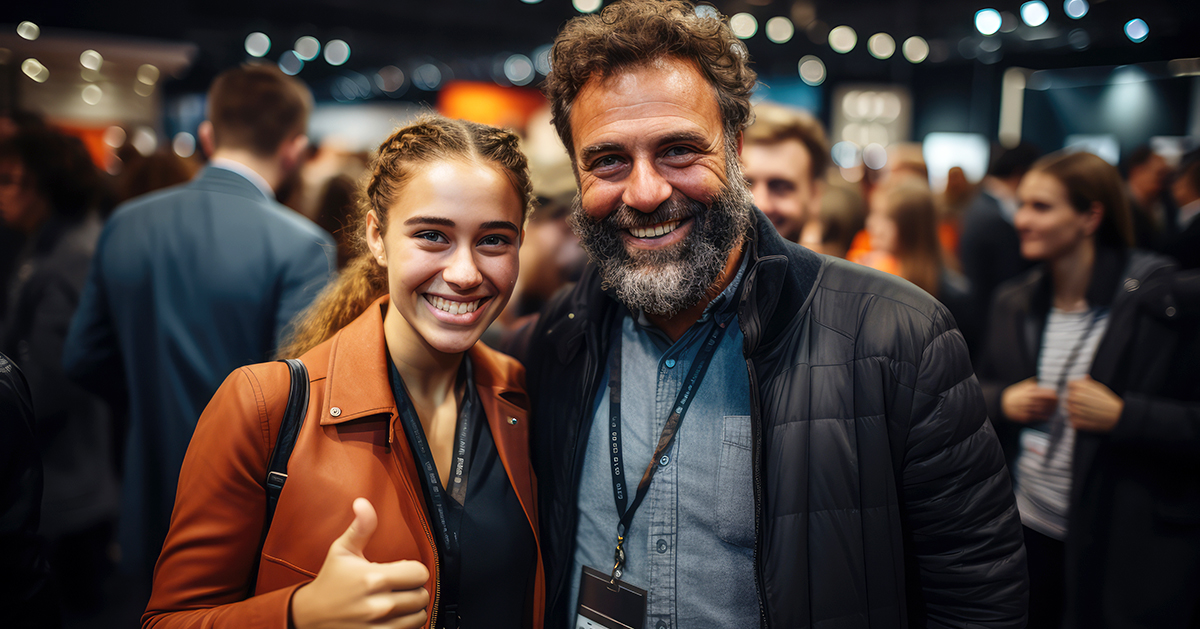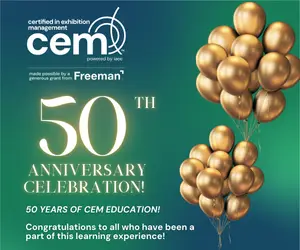Digital interactions dominate our professional lives. Therefore, the power of face-to-face experiences has never been more valuable – or more challenging – to execute effectively. Today’s exhibitions and events professionals operate in a complex environment where rising costs, evolving attendee expectations, and increasing pressure for measurable ROI (return on investment) demand a sophisticated blend of creative vision and operational excellence.
The Stagecraft Secrets learning track at Expo! Expo! IAEE’s Annual Meeting & Exhibition 2024 brought together industry experts to address these challenges. This specialized learning track was designed for professionals who understand that successful exhibitions require more than just good intentions; they demand strategic thinking, innovative design approaches and meticulous operational planning.
From reimagining entire event models to navigating international legal complexities and addressing modern security concerns, the sessions in this track provided actionable insights for creating impactful experiential marketing opportunities while maximizing budget efficiency. The presentations revealed a common theme: success in today’s competitive environment comes from combining data-driven decision making with creative problem-solving, all while maintaining unwavering focus on attendee experience and stakeholder value.
Whether you are transforming a long-standing conference format, planning your first international event or strengthening your security protocols, the lessons from these industry leaders offer a roadmap for elevating your events from good to exceptional. Here’s what we learned from three standout sessions that exemplify the strategic thinking required to master the stagecraft of modern exhibition management.
Reimagining Your Event: IAUG Annual Conference Transformation
This presentation by Innovatis Group’s Senior Manager of Fulfillment Julie Williams and Senior Vice President of Client Experience and Operations Colleen Jamieson detailed a comprehensive three-year transformation of the International Avaya User Group (IAUG) annual conference. This technology event operates as a unique co-hosted partnership between IAUG and Avaya, with shared responsibility for profit and loss, sponsorship recruitment, attendee acquisition and program development.
Before 2021, the IAUG conference was a substantial enterprise technology gathering featuring 2,800 attendees and 80+ exhibitors in a traditional four-day format. The event served Avaya users, partners and technology professionals seeking technical education, networking, and vendor showcases. However, by 2021, the conference faced critical industry-wide challenges that included rising operational costs, stagnant revenue growth, and fundamentally shifting attendee expectations shaped by post-pandemic changes in professional travel and time investment priorities.
The shared ownership model between IAUG and Avaya created both opportunities through combined resources and expertise, and complexities through the need for consensus-building across multiple stakeholders with potentially different priorities and competing interests for content and time allocation.
The Transformation Journey
Faced with these pressures and attendees’ increasing demand for high-tech, personalized experiences with measurable ROI, the event evolved through a strategic multi-year approach:
- 2022 – Learn and Inform: Deep analysis of attendee demographics, behaviors and feedback to understand what needed to change, while engaging opposing opinions early in the process.
- 2023 – Small Steps Toward Change: Reduced the event from four days to three days, streamlined content, elevated specialized tracks and began personalizing the attendee journey with dedicated messaging.
- 2024 – Commit and Create: Further condensed to two and a half days, completely reimagined the expo hall (renamed “Experience Hall”), introduced prefabricated kiosks with zone-based floor planning and prioritized partner experience alongside attendee needs.
Data-Driven Decision Making
Operating in an increasingly crowded technology event marketplace where attendees had numerous professional development alternatives, the team prioritized comprehensive stakeholder feedback analysis over assumptions. Key insights revealed that attendees preferred shorter events (no more than three days), wanted higher ROI on their time investment, felt overwhelmed by too many concurrent content options, and found traditional spending on giveaways and elaborate receptions had minimal impact on their experience.
Key Takeaways:
- Start Small and Build Momentum: Rather than attempting massive changes all at once, implement incremental improvements that demonstrate value and build stakeholder confidence across multiple organizational partners. Small changes can create significant impact when strategically planned and executed over multiple years.
- Let Data Drive Decisions, Not Opinions: Use comprehensive attendee behavior analysis, feedback surveys and revenue patterns to inform changes rather than relying on assumptions or the loudest voices among diverse stakeholders. This data becomes crucial ammunition when addressing resistance to change in complex partnership environments.
- Don’t Wait for 100% Buy-In: Change management in multi-stakeholder environments requires accepting that not everyone will support every decision. Focus on clear communication, provide visual renderings and detailed explanations to help partners visualize changes, but move forward with confidence when you have solid data and alignment with key objectives.
Legal Updates From a Global Perspective: Being in the Know!
Barbara Dunn, Partner at Barnes & Thornburg LLP, provided essential legal guidance for exhibition professionals managing international events. The session covered three critical areas: contract negotiations, risk management and regulatory compliance when organizing events outside one’s home country.
Contract Negotiations with International Partners
When working with international venues and service providers, event organizers face significantly different contractual expectations compared to domestic arrangements. Key partners include Professional Conference Organizers (PCOs), hotels, convention centers and various service providers. The international contracting landscape typically involves more upfront payments, limited payment method options, stricter hotel room block guarantees and reduced flexibility for event changes.
International contracts often include additional complexities such as imposed tax and service charges, compliance requirements with local regulations, new or different insurance obligations, and limited or no indemnification clauses. These factors require careful negotiation and thorough understanding of local business practices.
Risk Management and Contingency Planning
Global events face unique risks that require specialized contingency planning. Major risk categories include currency fluctuations, reduced event attendance, travel limitations or restrictions, global security threats, strikes and labor disputes, and force majeure events. Additionally, dispute resolution mechanisms may differ significantly from domestic standards.
International partners typically prefer to maintain contracts in local currency and may push for contract interpretation under local language and legal frameworks. Event organizers should expect little to no flexibility for space reductions, additional charges for furniture and equipment, limited concern from venues regarding travel restrictions or disruptions, non-refundable deposit structures, and force majeure clauses that favor rescheduling over cancellation. Local courts and jurisdiction clauses are also common.
Regulatory Compliance Requirements
International events must navigate complex regulatory landscapes that vary significantly by country and region. Critical compliance areas include personal data protection laws, visa and entry requirements for attendees and staff, business licenses and permits for event operations, customs regulations for shipping materials and equipment, various tax obligations, and sponsorship restrictions or requirements.
Exhibition organizers should expect strict enforcement of personal data protection laws (such as GDPR in Europe), mandatory requirements for specific business licenses and permits to operate events, the need to work with customs brokers for equipment and material imports, complex tax obligations with potential difficulties in obtaining refunds, and various restrictions on sponsors and other event participants based on local regulations.
Key Takeaways:
- Expect Stricter Financial Terms and Less Flexibility: International event contracts typically require more upfront payments, offer limited payment methods and provide significantly less flexibility for changes compared to domestic agreements. Budget for non-refundable deposits and be prepared for additional tax and service charges that may not be negotiable.
- Plan for Currency and Legal Jurisdiction Challenges: International partners prefer local currency contracts and local legal jurisdiction for dispute resolution. Factor currency fluctuation risks into your budget planning and understand that contract interpretation may default to local language and legal frameworks rather than your home country’s standards.
- Invest in Local Compliance Expertise Early: Each country has unique regulatory requirements for personal data, business licensing, customs, taxes and sponsorships that must be strictly followed. Engage local legal counsel or experienced customs brokers early in the planning process to ensure full compliance and avoid costly violations or event disruptions.
Profiling Your Events for Safety and Security
Jeff McKissack, President of Defense By Design, addressed the evolving security landscape facing modern events, emphasizing that exhibition organizers must now consider new dynamics beyond traditional safety concerns. Attendees gained valuable insights into identifying potential threats, understanding criminal tactics and implementing comprehensive risk mitigation strategies to protect attendees, assets, and organizational reputation.
New Security Dynamics and Threat Categories
Modern exhibitions and events face two primary security concerns that have become increasingly prevalent. Protests and protesters may target events for various reasons including political, social or religious motivations, while street crime encompasses random attacks, targeted attacks and collateral damage scenarios. Events become attractive targets due to large attendance numbers, specific featured speakers, media coverage, strategic locations, or particular audience demographics.
Jeff introduced the critical concept that, “The greatest threat to your event may not initially be a person with a gun or knife, but rather a person with a ‘good story.’” This highlights how individuals with seemingly legitimate reasons for access can pose significant security risks through social engineering and deceptive tactics.
Jeff outlined how criminals operate using three core strategies:
- Misdirection involves tactics like asking for assistance, faking emergencies, causing scenes, or using male/female distractions to divert attention from their true intentions.
- Illusion encompasses disguising one’s true identity through age, gender, ethnicity, religion, clothing, location, vehicle, perceived disability, or perceived profession.
- Accomplices work in coordination to create complex security scenarios that can overwhelm traditional detection methods.
These tactics emphasize why the common security advice to “see something, say something” is insufficient without proper training on what specifically to look for and how these deceptive techniques operate in real-world scenarios.
Comprehensive Risk Mitigation Framework
Jeff advocates for a multi-layered approach to event security that goes beyond physical measures. Pre-event verification includes confirming the identity of all venue personnel with access, requiring exhibitors to provide names and photos of attendees prior to check-in, and implementing different types of attendee identification based on risk assessment.
He noted that reputation management becomes crucial in today’s social media environment, where protests, riots and political confrontations can quickly escalate online and offline. He also advised that documentation and communication strategies include incorporating waivers into registrations, providing written and verbal communications to attendees about security measures, using signage and video reminders during events, and maintaining thorough documentation of all security efforts for legal and operational protection.
Key Takeaways:
- Recognize That Modern Threats Often Begin With Deception, Not Violence: The most dangerous individuals may initially appear legitimate and use “good stories” to gain access or trust. Train staff to identify social engineering tactics like misdirection, illusion and accomplice-based schemes rather than only looking for obvious physical threats.
- Implement Multi-Layered Pre-Event Verification: Don’t rely solely on traditional badge systems. Verify all venue personnel with access, require exhibitor attendee pre-registration with names and photos, and consider differentiated identification systems based on risk levels. The phrase “see something, say something” is meaningless without proper training on what to actually look for.
- Protect Your Reputation Through Comprehensive Documentation: In today’s social media environment, security incidents can cause lasting reputational damage beyond immediate physical harm. Incorporate security waivers into registration, maintain clear written communications about safety policies, use reinforcing signage and videos, and document all security measures to protect against legal liability and demonstrate due diligence.
Join the Conversation at Expo! Expo! 2025
As we look ahead to Expo! Expo! IAEE’s Annual Meeting & Exhibition 2025 taking place 8-10 December in Houston, these insights remind us that the obstacles the industry is currently facing require more than intuition; they demand proven strategies and expert guidance. Whether you are seeking to transform your existing programs, expand into global markets or strengthen your operational foundations, the expertise shared at Expo! Expo! 2025 will equip you with the tools and confidence needed to elevate your exhibitions and events from good to exceptional. Don’t miss this opportunity to learn from industry leaders who have successfully navigated the same challenges you are currently facing.


